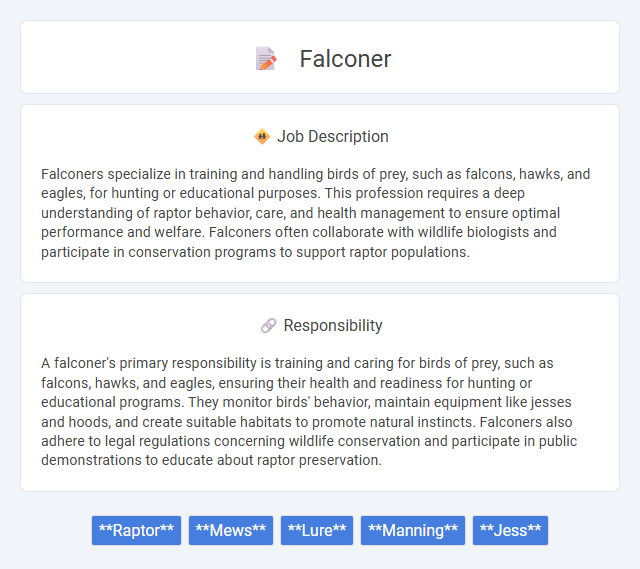
Falconers specialize in training and handling birds of prey, such as falcons, hawks, and eagles, for hunting or educational purposes. This profession requires a deep understanding of raptor behavior, care, and health management to ensure optimal performance and welfare. Falconers often collaborate with wildlife biologists and participate in conservation programs to support raptor populations.
Individuals who enjoy working closely with animals and have strong observational skills are likely to find falconry a suitable and rewarding profession. Those comfortable with outdoor environments and possessing patience and physical endurance may adapt well to the demands of training and caring for birds of prey. People less inclined to handle unpredictable wildlife or unable to commit significant time to the care and training routines might find the job challenging and less suitable.
Qualification
A falconer must possess a deep understanding of raptor behavior, avian biology, and animal husbandry to ensure proper care and training of birds of prey. Certification or licensing is often required, involving apprenticeships or formal training programs that emphasize safety, legal regulations, and ethical treatment. Strong observational skills and physical fitness are essential for handling and maintaining the health of falcons and other birds in various environments.
Responsibility
A falconer's primary responsibility is training and caring for birds of prey, such as falcons, hawks, and eagles, ensuring their health and readiness for hunting or educational programs. They monitor birds' behavior, maintain equipment like jesses and hoods, and create suitable habitats to promote natural instincts. Falconers also adhere to legal regulations concerning wildlife conservation and participate in public demonstrations to educate about raptor preservation.
Benefit
Working as a falconer may offer unique opportunities to develop a close bond with birds of prey, enhancing skills in bird handling and training. There is a probable increase in outdoor activity and exposure to nature, which may contribute to improved physical and mental well-being. The role might also provide niche educational and conservation benefits, potentially leading to involvement in wildlife preservation efforts.
Challenge
A falconer likely faces the challenge of building trust and effective communication with birds of prey, which requires patience and consistent training techniques. The unpredictable nature of wildlife behavior may demand quick problem-solving skills to ensure both the bird's and handler's safety. Adapting to varying environmental conditions and maintaining the health of the falcons can further complicate the daily responsibilities of this specialized profession.
Career Advancement
Falconers specializing in bird training and wildlife management can advance their careers by gaining expertise in raptor rehabilitation, conservation programs, and falconry education. Professional growth often involves obtaining certifications from recognized organizations such as the North American Falconers Association or the British Falconers' Club. Experienced falconers may progress to roles in wildlife agencies, educational institutions, or become consultants for environmental and hunting industries.
Key Terms
Raptor
Falconers specializing in raptors train birds of prey such as hawks, eagles, and falcons for hunting and conservation purposes. These professionals develop a deep understanding of raptor behavior, anatomy, and flight patterns to effectively manage and care for these skilled hunters. Their expertise supports wildlife management, falconry sports, and educational programs that promote raptor preservation.
Mews
Falconer jobs at Mews involve managing and training birds of prey for educational programs and events, enhancing guest experiences with interactive wildlife encounters. Mews specializes in providing immersive bird handling workshops and falconry demonstrations, requiring deep expertise in avian behavior and wildlife conservation. Expertise in falconry combined with strong customer engagement skills is essential for success in these roles at Mews.
Lure
Falconers use lures to train and exercise birds of prey by simulating prey in flight, enhancing the falcon's hunting skills and responsiveness. The lure, often made from leather and feathers, is swung or thrown to attract the bird's attention and reward it during hunting sessions. Effective lure techniques improve the bird's agility, speed, and return behavior, essential for successful falconry.
Manning
Manning plays a critical role in falconry by managing and training birds of prey to ensure precise hunting performance and safety. Effective manning techniques enhance the falcon's responsiveness, fostering a strong bond between the falconer and bird, crucial for successful hunting outcomes. Specialized manning skills include feeding schedules, weather adaptation, and flight reinforcement to maintain the bird's physical condition and hunting instinct.
Jess
Jess, an experienced falconer, expertly trains birds of prey for hunting and conservation purposes. She specializes in handling falcons and hawks, ensuring their health, behavior, and training align with strict wildlife regulations. Jess's deep understanding of raptor biology and flight patterns allows her to successfully manage falconry programs that promote ecological balance and environmental education.
 kuljobs.com
kuljobs.com